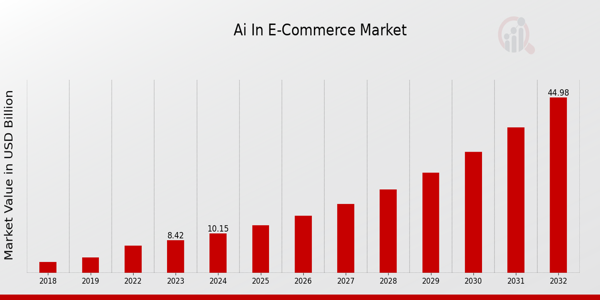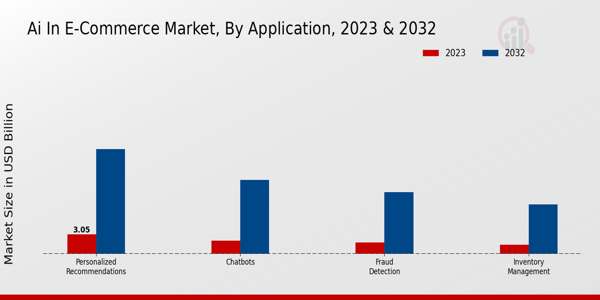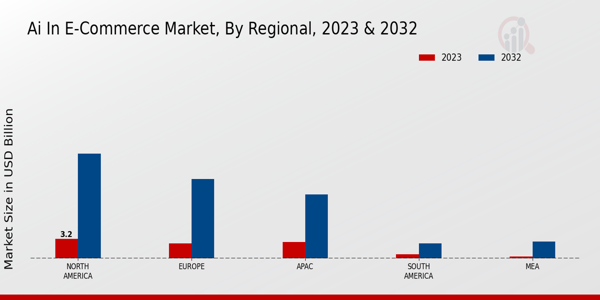Global AI in E-Commerce Market Overview:
AI in E-Commerce Market Size was estimated at 6.99 (USD Billion) in 2022. The AI in E-Commerce Market Industry is expected to grow from 8.42(USD Billion) in 2023 to 45.0 (USD Billion) by 2032. The AI in E-Commerce Market CAGR (growth rate) is expected to be around 20.46% during the forecast period (2024 - 2032).
Key AI in E-Commerce Market Trends Highlighted
Personalized shopping progressively shapes AI in the e-commerce market, providing value in the expenses. Retailers are willing farther to deploy smart tools to comprehend customer behavior patterns as consumers demand tailored suggestions and proposals. This technology assists in improving customer interaction by suggesting appropriate items and increasing the efficiency of the customer experience by using chatbots and virtual assistants. Furthermore, an increase in mobile shopping coupled with AI and sophisticated analytics is also driving this trend, thereby enhancing the efficiency of shopping. This fast-changing environment also has plenty of opportunities to be tapped into.
AI can be used in managing the inventory effectively, forecasting trends, and improving the supply chain. In addition, AI-powered smart pricing tools can assure the retailers' competitiveness while maximizing profits. These companies can also enhance their marketing practices with the aid of these technologies by targeting the right customers at the right place and at the right time. They should engage with technology start-ups and participate in AI training programs as traditional retailers do. The latest trends highlight the increasing role of voice and visual search in the e-commerce world, which has changed the way consumers shop and how they interact with online shops.
There is a growing focus on AI ethics and data privacy, as clients are becoming more concerned about how their information is utilized. Encouraged by the advancements in Artificial Intelligence, customers will have more 'augmented' experiences where they will be able to see how products look in real life. Social commerce is fusing with social media to create enjoyable shopping experiences where scrolling and buying products is effortless. Sustainable AI solutions are gaining traction, too, as many consumers are becoming more eco-conscious. In conclusion, business e-commerce AI worldwide is developing at a fast pace and with new trends coming that would change online shopping for the better.
The AI in E-Commerce Market is significantly driven by the increasing demand for personalized shopping experiences. As consumers seek tailored recommendations and offers, retailers are leveraging AI to analyze vast amounts of data and understand buying behaviors. This technology enhances customer engagement by providing more precise product suggestions and improving customer service through chatbots and virtual assistants. Additionally, the rise in mobile shopping and the integration of AI with advanced analytics are further propelling this growth, making shopping experiences smoother and more efficient. There are numerous opportunities to be explored in this evolving landscape.Businesses can harness AI to optimize inventory management, predict trends, and enhance supply chain efficiency. Moreover, using AI-driven tools for dynamic pricing strategies can help retailers remain competitive while maximizing profits. Companies that embrace these advancements can also improve their marketing strategies by targeting the right audience at the right time. Collaboration with tech startups and investing in AI training programs can further enable traditional retailers to adopt these innovations effectively. Recent trends emphasize the growing importance of voice search and visual search in e-commerce, transforming how consumers interact with online stores.The focus on ethical AI and data privacy is becoming more pronounced, as customers demand transparency in how their data is used. As AI capabilities evolve, we can expect more immersive experiences, such as augmented reality features that allow customers to visualize products in real-world settings. Social commerce and integration with social media platforms are becoming commonplace, allowing seamless browsing and purchasing experiences. The shift towards sustainability in AI solutions is another trend, as more consumers prioritize environmentally friendly businesses. Overall, the AI in E-Commerce Market is advancing rapidly, with ongoing innovations set to reshape the future of online shopping.

Source: Primary Research, Secondary Research, MRFR Database and Analyst Review
AI in E-Commerce Market Drivers
Increasing Demand for Personalized Shopping Experiences
The demand for personalized shopping experiences has emerged as a critical driver for the Global AI in the E-Commerce Market Industry. Consumers today seek more tailored interactions when they shop online. The increasing use of AI technologies enables e-commerce platforms to analyze vast amounts of consumer data, allowing them to offer customized product recommendations, targeted promotions, and tailored content. As the market expands and valuation increases, businesses need to leverage these technologies to engage their customers effectively.AI algorithms can analyze individual user behavior, preferences, and purchasing history to create personalized experiences that appeal to distinct consumer segments. This shift toward personalization not only enhances customer satisfaction but also drives sales and increases customer loyalty. Additionally, the integration of AI-driven chatbots and virtual shopping assistants enhances the shopping experience by providing real-time assistance, further satisfying consumer needs.The enhancing capabilities of AI in streamlining the shopping journey highlight its potential to transform how e-commerce businesses operate, making personalization one of the most significant market drivers in the evolving Global AI in the E-Commerce Market Industry.
Advancements in AI Technology
The rapid advancements in AI technology profoundly influence the growth trajectory of the Global AI in the E-Commerce Market Industry. Innovations in machine learning, natural language processing, and computer vision have enabled e-commerce businesses to enhance their operational efficiency. These advancements facilitate the automation of various processes, including inventory management, demand forecasting, and customer service. Moreover, as AI technologies become more sophisticated, the ability to analyze data in real- time allows businesses to make informed decisions quickly.This encourages businesses to invest more in AI solutions, driving further innovation and market growth.
Growing Need for Efficient Supply Chain Management
Efficient supply chain management has become essential for e-commerce businesses, and AI technologies play a pivotal role in optimizing these processes. The AI in E-Commerce Market Industry benefits as companies utilize AI for logistics, inventory management, and order fulfillment. AI-driven tools can predict demand patterns and optimize stock levels, reducing wastage and ensuring product availability. As businesses focus on improving operational efficiency to satisfy consumer demand in a competitive landscape, the reliance on AI solutions for enhancing supply chain management is expected to grow significantly.
AI in E-Commerce Market Segment Insights:
AI in E-Commerce Market Application Insights
The AI in E-Commerce Market within the Application segment is witnessing a remarkable expansion, with the market being valued at 8.42 USD Billion in 2023 and projected to reach 45.0 USD Billion by 2032. This growth trend is propelled by the increasing reliance on artificial intelligence technologies by e-commerce companies to enhance customer experiences and optimize operational efficiencies. Within this segment, Personalized Recommendations represent a significant portion, valued at 3.05 USD Billion in 2023 and expected to grow to 16.25 USD Billion in 2032.This sub-segment dominates the market as it leverages AI to analyze customer data and predict preferences, thereby improving product discovery and increasing sales conversions. Similarly, the Chatbots chatbot application is also crucial, with a valuation of 2.1 USD Billion in 2023, escalating to 11.5 USD Billion by 2032. Chatbots enhance customer support and engagement by providing immediate responses to inquiries, which is invaluable in maintaining customer satisfaction and loyalty. Furthermore, Fraud Detection is gaining importance in the market, holding a valuation of 1.8 USD Billion in 2023 and is expected to climb to 9.55 USD Billion by 2032.This application is essential as it helps safeguard e-commerce platforms against fraudulent activities, thereby protecting both consumers and businesses. Additionally, Inventory Management, valued at 1.47 USD Billion in 2023 and projected to reach 7.7 USD Billion by 2032, plays a pivotal role in optimizing stock levels and enhancing supply chain efficiency. Overall, the Application segment of the Global AI in the E-Commerce Market underscores the growing necessity for advanced AI solutions to drive market growth, mitigate risks, and cater to the evolving demands of customers.The substantial revenues across these applications highlight their critical role in shaping the future landscape of the e-commerce industry, making them indispensable tools for businesses aiming to gain a competitive edge. The market growth in these segments reflects a broader trend towards personalized and efficient e-commerce experiences, fueled by technological innovations in artificial intelligence.

Source: Primary Research, Secondary Research, MRFR Database and Analyst Review
AI in E-Commerce Market Technology Insights
The AI in E-Commerce Market is witnessing substantial growth, with the market expected to be valued at approximately 8.42 billion USD in 2023. The market growth is primarily driven by advancements in technology, significantly impacting various components of the e-commerce landscape. Key technologies such as Machine Learning and Natural Language Processing play a crucial role by enhancing personalization and customer interactions, thereby improving user experiences. Meanwhile, Computer Vision technology is significant for automating visual recognition tasks, which supports inventory management and product identification.Predictive Analytics has also gained prominence, as it enables businesses to forecast trends and consumer behavior, thus empowering data-driven decision-making. The integration of these technologies is expected to facilitate ongoing innovation and efficiency in the e-commerce sector. Furthermore, the AI in E-Commerce Market statistics indicate a growing emphasis on customer-centric strategies, prompting companies to invest more in these technologies to remain competitive in the industry.
AI in E-Commerce Market Deployment Model Insights
The AI in E-Commerce Market, valued at 8.42 billion in 2023, encompasses various deployment models that cater to the diverse needs of businesses. Within this segment, the Cloud-Based model is becoming increasingly popular due to its flexibility, cost-effectiveness, and scalability, allowing companies to quickly adapt to market demands without heavy upfront investmentsadapt to market demands without heavy upfront investments quickly. The On-Premises model, while typically having higher initial costs, offers enhanced security and control, appealing to businesses that prioritize data privacy and compliance.The Hybrid deployment model is gaining traction as it offers a balanced approach, combining the strengths of both Cloud-Based and On-Premises solutions, thus providing a seamless integration of data and applications. As organizations increasingly seek to leverage AI-driven insights to enhance customer experiences, the AI in E-Commerce Market segmentation reveals a growing trend towards cloud integration, supporting market growth through improved operational efficiency. With the significant demand for advanced data analytics and machine learning capabilities, the LGBTQ in the E-Commerce Market industry is poised to see substantial advancements in its deployment models over the coming years as organizations continue to explore opportunities for innovation and growth.
AI in E-Commerce Market End End-Use Insights
In 2023, the AI in E-Commerce Market is was valued at 8.42 USD billion and is projected to undergo considerable growth, positioning it as a significant driver of innovation across various end-use categories. The market encompasses three primary areas: B2C, B2B, and C2C. Each of these segments plays a crucial role in shaping the landscape of e-commerce, with B2C leading the charge as it caters directly to consumers, enhancing user experience through personalized recommendations and targeted marketing strategies. The B2B segment significantly contributes to market growth by streamlining operations and providing analytical tools that facilitate better decision-making for businesses.Meanwhile, the C2C segment fosters peer-to-peer transactions, utilizing AI to build trust and security among users, thus promoting a thriving online marketplace. These segments collectively highlight the diverse applications of AI, addressing unique needs and driving the overall AI in E-Commerce Market growth. As these segments evolve, they create a dynamic environment that presents various opportunities and challenges, ultimately contributing to the expansive AI in E-Commerce Market data and statistics.
AI in E-Commerce Market Regional Insights
The AI in E-Commerce Market is poised for significant growth across various regions. In 2023, North America holds held a dominant market position with a valuation of 3.2 USD Billion, expected to expand to 17.2 USD Billion by 2032, demonstrating its majority holding in the industry. Europe follows closely with a considerable valuation of 2.5 USD Billion in 2023, rising to 13.0 USD Billion by 2032, marking it as a significant player in the market. The APAC region stands at 2.7 USD Billion in 2023 and is projected to reach 10.5 USD Billion, showcasing its growing influence in the AI in E-Commerce space.South America, while smaller, with 0.7 USD Billion in 2023, is anticipated to grow to 2.5 USD Billion, indicating emerging opportunities within this region. The Middle East and Africa (MEA) segment, valued at 0.32 USD Billion in 2023, is expected to rise to 2.8 USD Billion, highlighting its developing engagement in the AI in E-Commerce market. The overall market is driven by trends such as personalization and automation, while challenges include data privacy and integration complexities. As such, the AI in E-Commerce Market segmentation reveals distinctive trends and dynamics influencing growth across these diverse regions.

Source: Primary Research, Secondary Research, MRFR Database and Analyst Review
AI in E-Commerce Market Key Players and Competitive Insights:
The AI in E-Commerce Market is characterized by an intense competitive landscape, where companies are leveraging artificial intelligence technologies to enhance customer experience, optimize supply chains, and improve operational efficiency. As e-commerce continues to grow at an exponential rate, the application of AI has become a pivotal element in driving innovations across various segments, including personalized marketing, chatbots for customer service, recommendation engines, and predictive analytics. The competitive insights within this market reveal a slew of dynamic players who are consistently innovating their offerings to capture market share. Moreover, with the increasing emphasis on data analytics and machine learning, businesses are seeking robust AI solutions to stay ahead of the curve and become more agile and responsive in a bustling online retail environment.IBM has established a formidable presence in the Global AI AI in E-Commerce Market in E-Commerce Market, underscoring its capabilities in providing powerful AI solutions tailored to enhance consumer engagement and streamline business operations. With its advanced data analytics and machine learning models, IBM allows retailers to offer personalized shopping experiences, driving customer satisfaction and loyalty. The company’s company's strength lies in its ability to harness vast amounts of data and provide actionable insights to e-commerce businesses, ensuring they are equipped to make informed decisions in real- time. The integration of IBM's AI-driven tools into various retail platforms has enabled clients to significantly improve inventory management, optimize pricing strategies, and predict customer behavior with remarkable accuracy, positioning IBM as a frontrunner in this transformative marketplace.Microsoft’s Microsoft's contribution to the Global AI in the E-Commerce Market is distinguished by its focus on providing intelligent solutions that help businesses adapt to evolving consumer expectations. By leveraging its robust cloud platform, Microsoft Azure, the company empowers e-commerce businesses to utilize AI solutions that enhance operational efficiency and improve customer interaction. Microsoft has developed an array of tools, including integrated AI services and machine learning frameworks, specifically designed to cater to the needs of online retailers. This positions Microsoft as a vital partner for businesses looking to implement sophisticated AI strategies without the complexities often associated with traditional software solutions. The strength of Microsoft lies in its vast ecosystem of partners and developers, which drives innovation and ensures that retail clients can access cutting-edge AI capabilities that address their unique challenges in a rapidly changing market landscape.
Key Companies in the AI in E-Commerce Market Include:
-
IBM
-
Microsoft
-
Salesforce
-
eBay
-
Amazon
-
Shopify
-
Facebook
-
Nvidia
-
SAP
-
Zebra Technologies
-
Google
-
Oracle
-
Alibaba
-
C3.ai
-
Adobe
AI in E-Commerce Market Industry Developments
Recent developments in the AI in E-Commerce Market reflect significant advancements and increasing investments among key players. IBM and Salesforce have been enhancing their AI-driven tools to improve customer engagement and personalize user experiences, while Microsoft continues to integrate AI into its e-commerce solutions. Amazon and Alibaba are expanding their AI-powered logistics and inventory management systems, resulting in improved operational efficiencies and customer satisfaction. The competition remains high as Facebook and Google are exploring new advertising technologies driven by AI analytics, shaping marketing strategies for businesses.
In terms of mergers and acquisitions, SAP's strategic partnership with Qualtrics aims to leverage AI tools for enhancing customer experience, and Shopify has acquired a data analytics company to bolster its AI capabilities. Nvidia's focus on AI-powered recommendation engines is gaining traction in e-commerce platforms, while Oracle's investments in machine learning technologies aim to optimize supply chain management. Overall, these advancements and collaborations are significantly impacting the market, indicating a robust growth trajectory as companies adapt to evolving consumer behaviors and seek competitive advantages through AI technologies.
AI in E-Commerce Market Segmentation Insights
-
AI in E-Commerce Market Application Outlook
-
AI in E-Commerce Market Technology Outlook
-
AI in E-Commerce Market Deployment Model Outlook
-
Cloud-Based
-
On-Premises
-
Hybrid
-
AI in E-Commerce Market End End-Use Outlook
-
AI in E-Commerce Market Regional Outlook
-
North America
-
Europe
-
South America
-
Asia Asia-Pacific
-
Middle East and Africa
| Report Attribute/Metric |
Details |
| Market Size 2022 |
6.99(USD Billion) |
| Market Size 2023 |
8.42(USD Billion) |
| Market Size 2032 |
45.0(USD Billion) |
| Compound Annual Growth Rate (CAGR) |
20.46% (2024 - 2032) |
| Report Coverage |
Revenue Forecast, Competitive Landscape, Growth Factors, and Trends |
| Base Year |
2023 |
| Market Forecast Period |
2024 - 2032 |
| Historical Data |
2019 -– 2023 2022 |
| Market Forecast Units |
USD Billion |
| Key Companies Profiled |
IBM, Microsoft, Salesforce, eBay, Amazon, Shopify, Facebook, Nvidia, SAP, Zebra Technologies, Google, Oracle, Alibaba, C3.ai, Adobe |
| Segments Covered |
Application, Technology, Deployment Model, End Use, Regional |
| Key Market Opportunities |
Personalized customer experiences, Intelligent inventory management, AI-driven pricing strategies, Enhanced fraud detection systems, and Optimized supply chain operations. |
| Key Market Dynamics |
Personalization of customer experience, Enhanced inventory management efficiency, Predictive analytics capabilities, Improved customer service chatbots, Fraud detection and prevention |
| Countries Covered |
North America, Europe, APAC, South America, MEA |
Frequently Asked Questions (FAQ) :
The AI in E-Commerce Market is expected to be valued at 45.0 USD Billion by 2032.
The expected CAGR for the AI in E-Commerce Market is 20.46% from 2024 to 2032.
North America is expected to dominate the AI in E-Commerce Market with a value of 17.2 USD Billion by 2032.
The value of the AI in E-Commerce Market for Personalized Recommendations is projected to be 16.25 USD Billion by 2032.
Major players in the AI in E-Commerce Market include IBM, Microsoft, Salesforce, eBay, Amazon, and Shopify.
The projected market size for Chatbots in the AI in E-Commerce Market is expected to be 11.5 USD Billion by 2032.
The expected market size for Fraud Detection in the AI in E-Commerce Market is projected to reach 9.55 USD Billion by 2032.
The anticipated value of the AI in E-Commerce Market in Europe is expected to be 13.0 USD Billion by 2032.
The estimated market size for Inventory Management is projected to be 7.7 USD Billion by 2032.
The expected growth of the AI in E-Commerce Market in the Asia-Pacific region is projected to reach 10.5 USD Billion by 2032.





























